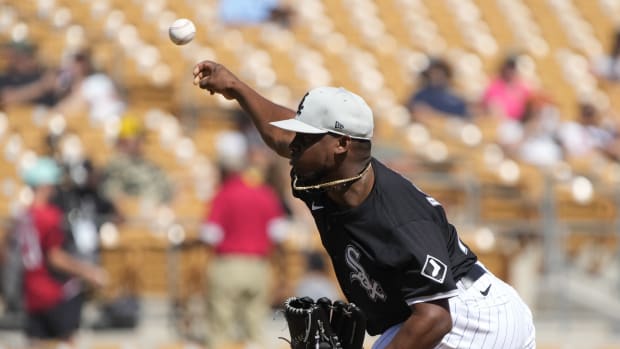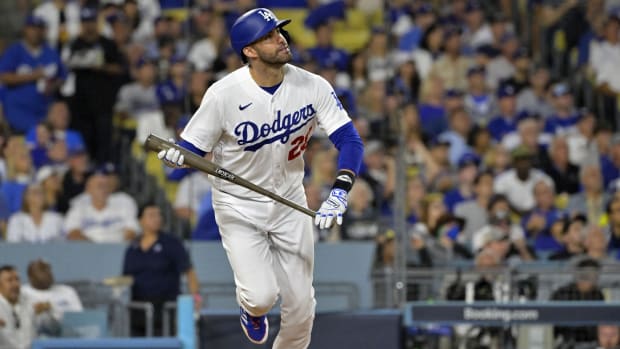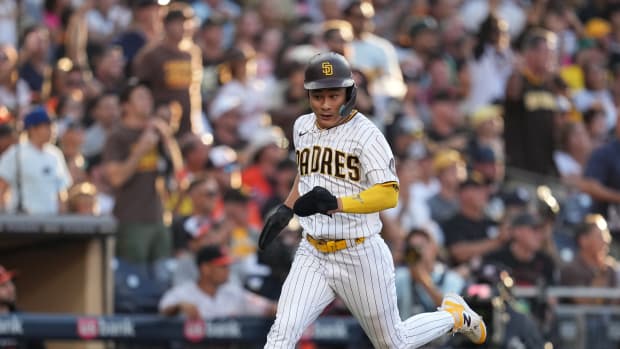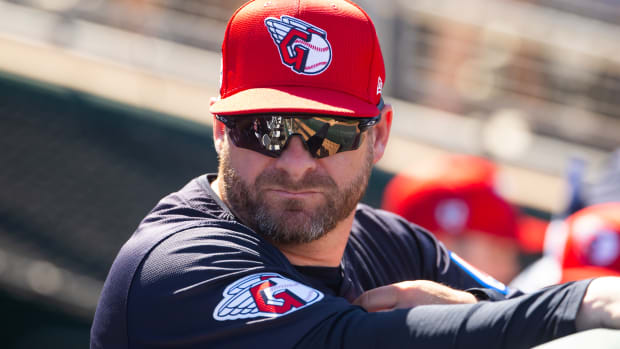From Sochi to The Show: Marlins' Eddy Alvarez Becomes First Winter Olympic Medalist to Play MLB
The first time Eddy Alvarez’s dreams came true, he wrapped himself in a Team USA sweater, strode into the Opening Ceremony at Fisht Olympic Stadium in Sochi, Russia, and tried to hear himself think over the roar of some 40,000 fans. The second time his dreams came true, he was wearing a Miami Marlins jersey, walking up the dugout steps at Camden Yards and gazing at a sea of empty seats.
Short-track speed skating, for which Alvarez won an Olympic silver medal in 2014, and baseball, for which he just became a major leaguer, don’t have much in common. “We go left,” he says, laughing, of the route around the track and the route around the base paths. But both taught him to persevere through challenges. And this season has been full of them.
Alvarez, 30, became a major leaguer amid a pandemic that has killed more than 150,000 Americans. He got the call because his team is still grappling with a coronavirus outbreak that felled 18 players and two coaches. His girlfriend, Gaby Pearson, is 37 weeks pregnant with their first child, a boy, and has spent most of her third trimester in lockdown, away from family and friends.
Life is scary right now. But there are also moments of joy, such as on Monday, when Alvarez answered his phone to hear a handful of executives on a conference call. “We’ve selected your contract,” they told him. He and Gaby wept. Then they got to work on logistics. They live in Miami, five blocks from his parents, but the Marlins’ minor leaguers have been working out at their spring training facility in Jupiter, an hour and a half north. Alvarez had to drive to the park to gather his things before the trip to Baltimore. On the way, he swung by his parents’ house.
He banged on the windows and asked them to come outside. They stood by the door, confused. From the driveway Eddy yelled, “We did it!”
But he was so excited he forgot to be more specific.
“What did we do?” his dad asked.
Eddy had chosen the pronoun carefully. His parents, Walter and Mabel, are Cuban immigrants who carry baseball in their blood, so they were unsurprised when the boy began swinging a bat before he could walk, mimicking his older brother, Nick. (He also has an older sister, Nicole.) But then they bought him a set of plastic rollerblades when he was five, and suddenly supporting Eddy meant spending weekdays at the baseball field and weekends in South Beach, where he did tricks in front of crowds. When he was seven, someone suggested he try the ice.
“There is no ice in Miami,” says Walter. But Eddy wanted to try. So they began renting Kendall Ice Arena, 40 minutes east, for an hour on Sunday mornings, 5 to 6. They would arrive at 4:30 to set up padding so Eddy didn’t kill himself crashing into walls.
Soon those weekends in South Beach had become weekends in Minneapolis and Cleveland. Eddy was still playing baseball, so they still spent their weekdays at the baseball field. He would practice on inline skates some evenings; Mabel would ferry him around in the family’s Dodge Caravan, trying to remember whether to pull skates or spikes from the trunk. They would fly out on Friday evening, Eddy would compete in speed skating on Saturday and Sunday, and then they would take the red-eye home to begin another week.
“The skating coaches didn’t want him to play ball,” Walter says. “The baseball coaches didn’t want him to skate.”
When Eddy was in high school, baseball won. But he had made skating friends across the world, and as he watched them make their various national teams and prepare for the Olympics, the envy ate away at him. He declined his college baseball scholarship offer. Despite two aching knees, he committed himself completely to making the 2010 team.
He fell short. His knees hurt and he was frustrated. He quit speed skating and walked onto the baseball team at Salt Lake Community College. He started at shortstop, hit .303 and made the all-conference team. Before the next season, he finally got the double knee surgery he had needed for years, and he went back to skating.
He made the 2014 Olympic team, soaked in that moment at the Opening Ceremony, won silver in the 5,000-meter relay … and quit. For some people, that would be the achievement of a lifetime. For Alvarez, it was the first step. He signed with the White Sox and made his way up the system before they traded him to Miami last year.
“Baseball is my true passion,” he says now. “Skating was more of a short-term goal.”
The short-term goal made him the first Cuban-American to make the U.S. men’s speed skating team. That, plus the passion, made him the first Winter Olympic medalist to play in the major leagues. And those, plus the pandemic, made him yet another ballplayer—82 at last count—to debut in an empty stadium. At least until his teammates start to return from the COVID-19 injured list, he’s a major-league infielder. He’s trying to soak up every instant.
“I know that these opportunities only come once in a lifetime,” he says.
Well, once or twice.


































